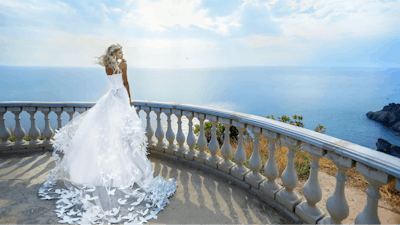
The future of fashion starts with sustainability.
Many designers seek to use only the most ethical fabrics, blending humanitarian causes with a love and appreciation for that next significant fashion trend.
The wedding industry is not ignorant of this call for more sustainability. With an estimated worth of $3 trillion, the fashion industry employs 3,384.1 million people and makes up 2% of the world's Gross Domestic Product (GDP).
Cast Your Eyes on Medusa
Medusa London bridal dresses could change the fashion world forever.
Medusa wedding dresses are dresses for real people with natural bodies, not models with unattainable figures found in the center of fashion spreads. The dresses are made with luxury sustainable materials like 100% organic silk. They are designed for comfort and are free of constraints.
"We worked with real bodies for brides to feel confident in buying our pieces, says Medusa's founder Agnese Petraglia. "Living in London and Italy, I wanted a collection that mixed my love for the old romanticism with the new in a minimalist key. Medusa is for brides who don't follow the rules; they make them."
This line targets the modern, conscious bride who may take a minimalist approach to fashion, choosing chic and understated looks.
The debut collection, inspired by Greek mythology and modern aesthetics, features nine designs that can be paired with such accessories as statement sleeves, belts, overskirts, and veils to express each bride's unique personality.
Medusa London launched in 2021.
What Makes Fashion Sustainable?
Petraglia is passionate about her work. Her team ethically constructs all her gowns using fabric manipulation. She uses 100% organic silk certified by the Soil Association for being processed in accordance with the Global Organic Textile Standard (GOTS). Even the zippers are made from post-consumer recycled plastic bottles (1 bottle = 3 zippers).
In recent years, the fashion world has taken a more active role in its responsibility to the global community. The U.N. Fashion Charter, founded in 2018, met again last year to renew its commitments to a more sustainable fashion future, with pledges to reduce emissions and address the poverty and low wages often associated with the fashion industry.
"Work under Fashion Charter for Climate Action is guided by its mission to drive the fashion industry to net-zero Greenhouse Gas emissions no later than 2050 in line with keeping global warming below 1.5 degrees," according to a report from the U.N.
They have identified several areas that need work:
- A decarbonization pathway and emission reductions
- Raw material
- Manufacturing and energy
- Policy engagement
- Promoting broader climate action
- Addressing brand-owned or operated emissions
Young brands like Medusa know they must put sustainability at the forefront of their mission.
Is Sustainability Really Attainable?
Although more than 150 fashion brands have committed to working with the U.N. Fashion Charter to make the fashion world more equitable in the future, many critics believe sustainability and fashion don't match.
"Few industries tout their sustainability credentials more forcefully than the fashion industry," says Kenneth P. Pucker in a piece for the Harvard Business Review. However, the former COO of Timberland argues that these concerns for the environment don't actually help the Earth we populate.
He speaks on the increased production of shirts and shoes, which has doubled over the past twenty years. "Three-quarters end up burned or buried in landfills," he says.
While Pucker may be critical of a brand's transparency, recycling policy, and use of bio-based materials, many in the fashion world still believe there is a place on the runway for sustainable practices, and up-and-coming designers like Agnese Petraglia may usher us into a future with ethical fashion for every day lives.
The Medusa Mission
"I was inspired by the lack of sustainable choices in the bridal industry and the fact that more and more brides are looking for options that can reflect their modern sense of style," Petraglia told Wealth of Geeks.
"The bride of today looks for a dress that can be personalized and that can really show their personality," she explains. "Brides are no longer looking for traditional dresses as they're no longer sticking to the rules of tradition."
For her debut line, Petraglia names her dresses after powerful Greek figures like Athena, Calypso, and Aphrodite.
"I wanted to create quality pieces that can be easily transformed and that can become a staple piece in each bride's wardrobe while being made in a way that cares about the environment," she says. "In the future, I am definitely planning to expand my collection and create even more sustainable choices such as separates and mini dresses, and in the long term, I would love to explore evening wear."
If Petraglia's dreams are to become a reality, Medusa's reign of equitable fashion for real women has only just begun.






















